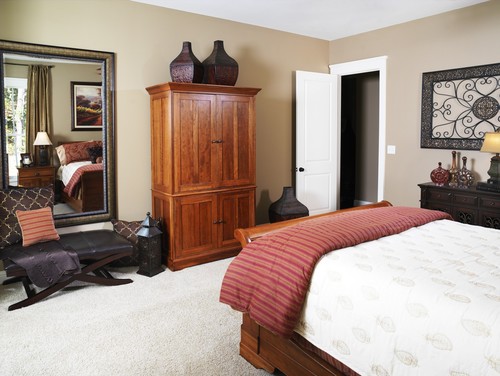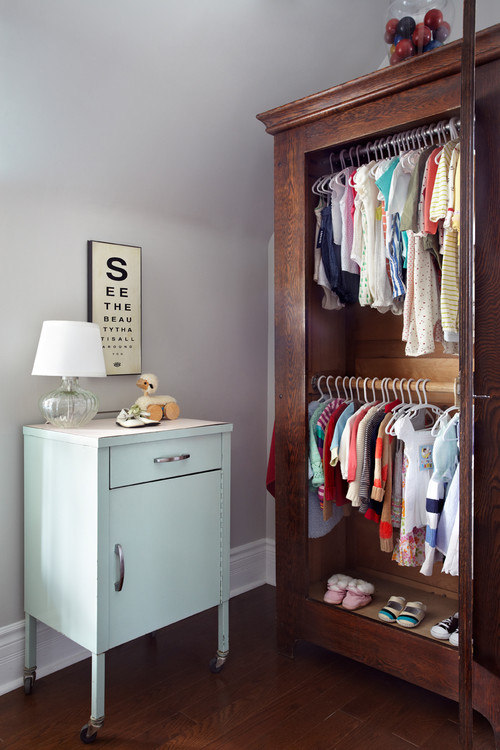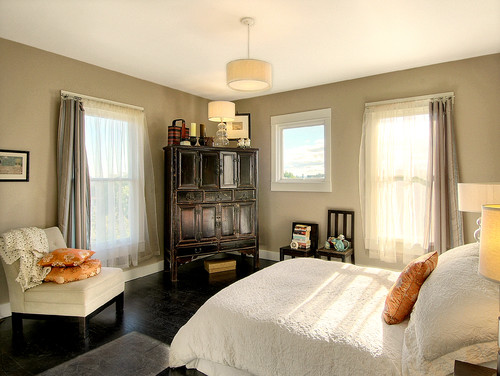
iStock/GoodboyPictureCompany
Closet space is almost always in short supply. Some rooms in your home may lack a closet, while others may have closets that are too small or completely packed.
If this is a problem that plagues your house, we have a solution: Enter the armoire! An armoire (also called a wardrobe) is often an overlooked item in the home, but it can play so many roles and offer scads of storage space.
“Most armoires are conversation pieces, so bring one into your space and then build the rest of your room’s decor around it,” suggests Marty Basher, a designer and organization expert at Modular Closets.
An armoire is ideal in a studio apartment with limited closet space or a larger bedroom that needs a bit of flair. And it’s extremely versatile.
“You could use it as an entertainment center, a crafts area, or to store tools in it like a mini shed,” points out organization expert Julie Coraccio.
Read on for more on the armoire, including its history, how to use it, and which ones are right for your space.
A brief history of the armoire
This piece hails from France in the 17th century, though the name may have come from the Latin word armorium, which was a chest for storing armor, notes Lisa Zemenak of Lauter’s Fine Furniture.
The armoire came about out of pure need since old homes didn’t sport big closets in every room.
“There were chests, of course, for holding linens and blankets—and armoires filled the void by offering a place for hanging items, and they also typically had drawers,” shares Basher.
Armoires have existed for centuries as multifaceted storage spaces, and most contain a rod for hanging items and drawers or cubbies—all of which makes this piece the perfect closet stand-in.
“You could also add a tension rod to create double hanging space, and a shoe storage unit can be included for footwear,” notes Basher.
Keep in mind that some modern armoires aren’t as deep as their older cousins, so hanging shirts may not be possible (pants should fit fine). And when you do pick a piece, keep safety in mind.
“Armoires should be attached to the wall as the doors tend to be heavy and the piece could tilt forward if a small child were to climb it,” warns Zemenak.
Where to put an armoire
Try an armoire in your entryway for coats, umbrellas, hats, and shoes, suggests Basher.
Karen Gray-Plaisted of Design Solutions KGP has two armoires in her home.
“One is in the bedroom and was retrofitted with shelving so it’s basically a dresser, and the other is quite large and holds our TV, stereo system, and vinyl records,” she says.
Photo by Lisa Ferguson Interior Design
How to find the best armoire for your space
Armoires are rather large, so don’t purchase one before making sure it’ll fit and you’re able to get it inside your home or apartment.
“Real antique armoires may be taller than some modern ceilings, and their size and weight can make them difficult to deliver up stairs, in elevators, and down narrow halls,” points out Beverly Solomon of the eponymous design firm.
And if you do remove shelves, make sure you don’t compromise the structural integrity. Also a no-no is overloading the shelves as they could cause the armoire to split apart.
Here’s more on the various types and sizes of armoires, and which one is best for you.
Keane armoire
Coraccio picks this piece and suggests taking out the two shelves if you need to hang something longer ($1,999, Crate&Barrel).
“The wood seems solid enough to hold hooks for scarves, and you still have the drawers for sweaters and jeans,” she adds.

Crate&Barrel
Shaker-style armoire
Loads of storage choices make this armoire a winner, and you can’t argue with the price ($650, Wayfair).

Wayfair
Merriton armoire
Basher feels this is the perfect, modern armoire ($1,038, Anthropologie).
“It’s smaller in scale, so it’s great for small rooms, kids’ bedrooms, or entryways, and the color and details allow it to work with almost any room color and other pieces of furniture,” he says.

Anthropologie
South shore armoire
“This one’s just all-around amazing because of the ample storage, great colors, clean lines, and it’s not too overbearing in size. Plus, the price ($327, Overstock) is unbeatable,” says Basher.

Overstock
The post No Closet? No Problem—Try an Armoire appeared first on Real Estate News & Insights | realtor.com®.




No comments:
Post a Comment